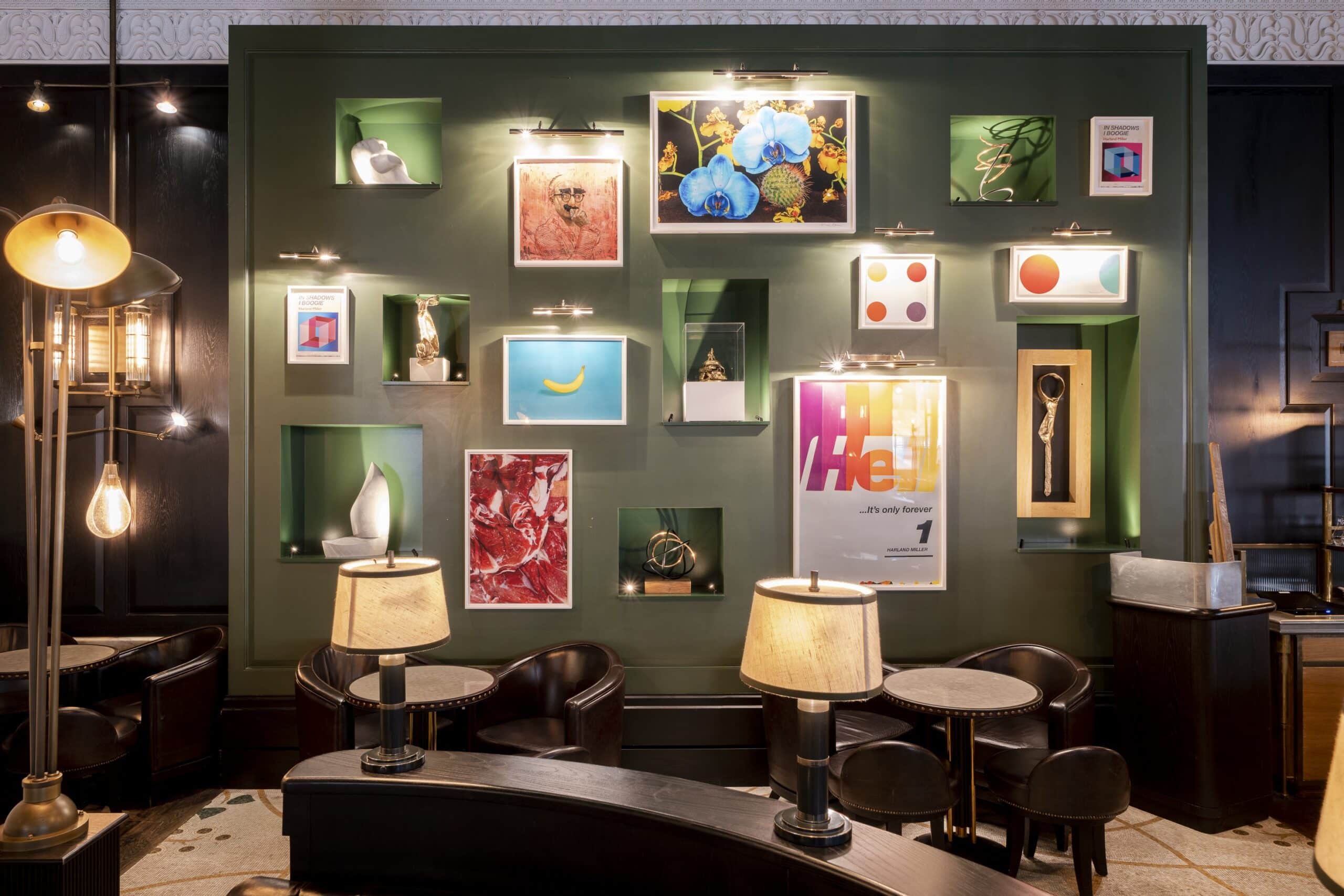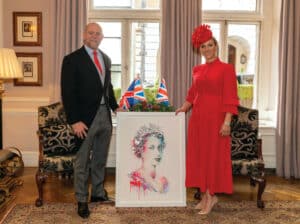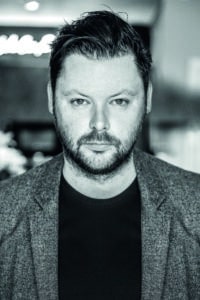 BBC News
BBC NewsBorrowing was £17.4bn last month, the second highest October figure since monthly records began in 1993.

Christopher Jackson interviews a likeable art dealer with an incredible backstory
Humility is a wonderful thing. As soon as you meet Liam West you find yourself mentally revising your idea of the art world. West, the hugely successful founder of West Contemporary, meets me at Kerridge’s Bar and Grill in the Corinthia Hotel. West is sitting quietly in a corner – with an air of humble diligence – hunched over some paperwork with a team member. You wouldn’t know that all the art on the walls is here because of his acumen and reputation – or that this is one of the leading figures in the UK art world.
So how did he become involved in the sector? “I was brought up in New Cross in South London – which is part of the Old Kent Road, the cheapest block on the monopoly board,” he recalls, with a smile. “But crucially, I was also born a couple of roads away from Goldsmiths University, where the YBAs (Young British Artists) came from. I just fell in love with that movement.”

Such is London: you might grow up feeling you have poor life chances but opportunity is always adjacent. And West is referring, of course, to that group of artists Damien Hirst, Sarah Lucas and Tracey Emin, who had nothing much to do with one another, other than being lumped together by the British press. When they came to prominence, they collided with Britpop and the outset of the Blair administration. Briefly, pre-Iraq, anything seemed possible – and it turned out that quite a lot was.
And especially for West. What was his career journey? “I ended up finishing college not knowing what I wanted to do,” he recalls. “My Dad used to be a bus driver at New Cross garage, but went on to work for the Law Society. He had someone doing CVs, so I went in. My parents never had the funding to do the university route anyhow. But my CV was done.”
This led to a bit of luck: “The lady that my dad gave my CV to for typing took it home to her husband. As it happened, he ran a fine art print company in Nunhead called Napier Jones. I got a phone call out of the blue saying they were looking for someone to come and do an apprenticeship.”
Initially, West was unsure about this development: “I wanted to continue my education, but I decided to do three months over the summer. On day one, Damien Hirst walked through the door; they were doing a limited edition litho print for him.”

That sounds like a good first day – but, as time went on, West was continually impressed by the variety of work. “It just continued. We were working with Agnew’s at Bond Street, White Cube, and all the galleries around St James’s. I fell in love with it.”
West stayed for five years moving over time to a customer-facing role. He then started his journey in to reprographics and joined a company called Icon near Borough Market in Southwark: “I kind of hit the ground running,” West recalls, “and I ended up being the MD of that company, managing over 50 staff, very quickly by the age of 23.”
It was an impressive rise. West recalls for me an important incident in the year 2000: “We had a salesman called Nick Duchamps. His great-grandfather had been Monet’s art dealer. He came flying through the door one morning and he said: ‘He’s only done it again’. I said: ‘Who?’ He said: ‘Banksy’. And I said: ‘Who’s Banksy?’”
We can catch here something of the energy an artist harnesses when they’re about to go global: sudden unanimous fascination among those who mind about the latest thing. From that time onwards, West was hooked by Banksy’s work: “I started blogging about Banksy; it became a hobby.”
West had discovered street art and its global superstar. He then went on to start a company Beautiful Crime, which in time would become dedicated to the sale of street art. How did he come up with the name? “Those words come from a French artist called Monsieur A who’d been interviewed by a high end magazine and they’d said: “Don’t you know that what you’re doing is vandalism?” He said: “No, it’s not; it’s beautiful crime.”

West would go on to co-create the world’s first online gallery for street art originals. I can’t help but ask, hoving near a possible scoop, if he knows Banksy and will consider revealing his identity? But West smiles: “I’ve been in the same room as him, but I’ve never spoken to him. I know it’s him, because I’ve been with people who actually worked for him at Pictures on walls . He was often referred to as Dave, which is not his real name. It’s quite remarkable how well he’s been protected over the years. And rightly so. I mean, he’s obviously a global phenomenon now. And pound for pound probably is the most expensive artist in the world.”
Eventually, having saved up a year’s salary from his day job, West became full time at Beautiful Crime. “Our big break came when we were asked to design the Coca-Cola bottles for the Olympics 2012 using local urban artists. They were so impressed that they asked us to design their HQ for the Olympics on the Southbank ”
Word spread and soon West could count The Royal Albert Hall, Adidas, Microsoft, All Saints, Levi’s, Peroni, and numerous others as his clients.
Was it difficult to overcome the perceived gulf between the world of street art and the commercial art sector? “It was tricky at first because street art is seen as a bit of an anarchic movement and a lot of street artists didn’t want to be involved in that world. But when the opportunity actually arose, I don’t think any of them turned it down.”
By 2013, he’d opened his first gallery in Shoreditch. “Then, in 2015, we won the commission to create a large public sculpture in marble for the Dubai Opera House. That now sits proudly on Dubai Opera House’s Plaza: everyone who goes into Dubai Opera House has to go past it. That was a huge step up but we were advised that our company name wasn’t ideal for the Middle East market. That allowed me to completely rebrand as West Contemporary.”
By 2018, he was ready for his next move – to Kerridge’s Bar and Grill at the Corinthia. “Tom opened this restaurant in 2018,” West recalls. “He said, ‘I want to build you a gallery.’ I’ve never been one for putting art in restaurants. I’ve always said if you want to buy meat, you’ll go to a butcher. So why would you buy art from a restaurant?”
What changed his mind? “Amazon shows us we’re all bereft of time. I never thought we’d come to a point where people would be buying art online for thousands but here we are. We did a show in October 2021 where we sold 24 artworks for between £18,000 and £35,000. Not one of them was to the UK. So not one of them had been seen by the purchaser in the flesh. That still astounds me.”
Meanwhile, the gallery itself has been an astonishing success. “I call it a showroom. Tom completely changed the food world by convincing Michelin that you could have a two Michelin star pub. I put a lot of trust in Tom who said: “Look, we’re going to create something new here. We’re going to call it gastro art’.”
Just as important as these successes is what West does for the artists themselves. West notes that many artists leave college uncertain about vital aspects of the art world. “They don’t teach you about art management, how to go about marketing, framing, printing, and all that goes with it . My favourite thing is to take an artist from the very beginning of their journey and help them.”
Who does he represent? West now argues that street art doesn’t really exist anymore (“Banksy is selling in the same auctions as Picasso or Warhol”), and so he’s broadened his roster. “Graffiti artists make up ten to 15 per cent of our roster of artists. But now we work with every sector: neon artists, mixed media, artists that are particularly inspired by sustainability, pencil drawing artists, sketch artists, spray can artists, painters, photographers, the whole lot. It’s a really exciting time.”

I’m keen to ask West about hot topics in the art world. What does he think of NFTs? “A complete Wild West at the moment, but I do think NFTs and blockchain are going to be game-changing for art authentication.”
He adds: “The one who’s really nailed the NFT market is Damien Hirst. And it’s quite clever what he does: with his latest collection, you can buy the physical artwork, or you can buy the NFT. But at any point, you can swap the NFT back for the original artwork. The last release he did, the NFTs outsold the actual physical artwork.”
And does he have any advice for young artists? “To be honest with you, it changes all the time. The problem is getting your name out there. There’s a lot more opportunity today. It used to be a really closed shop. Social media has completely opened that up. Bond Street galleries are signing people up who’ve made it through social media because they’ve built their own market.”
And how should young artists price their works? West explains: “Tom also had a restaurant in Manchester called the Bull and Bear. We did all the art there, and we created a Fine Art prize. We ended up choosing a young artist called Tom Yates, who’s 26 from the Manchester area. We’re going to nurture him, but we’ll start off at £150. Each costs £50 to create, so there’s a £100 profit in it – and then you build it up.”
What does the cost of living crisis mean for artists? “The problem I think young artists will have is getting materials when everything has gone through the roof. I think paper’s up 100%, as are inks. Certainly framing, wood, glass –
everything across the board is up 50-60% When you want to put on a show, the overheads for printing and framing just build up, incredibly so.”
Which means that many artists, floundering in these currents, need his help. Yet you never feel that for all his success, West is the least bit impressed with himself or arrogant. That’s the thing about success. It’s about hard work, and talent – and West has these things. But to travel so far so quickly and remain kind is the hardest thing of all. And he’s done that too.